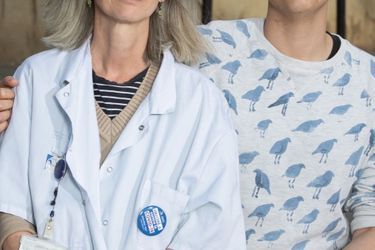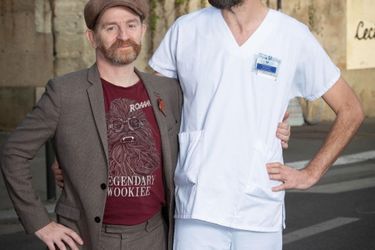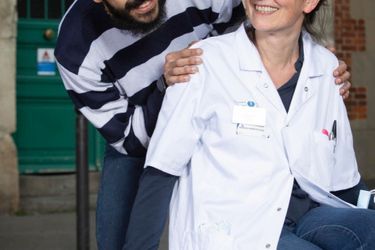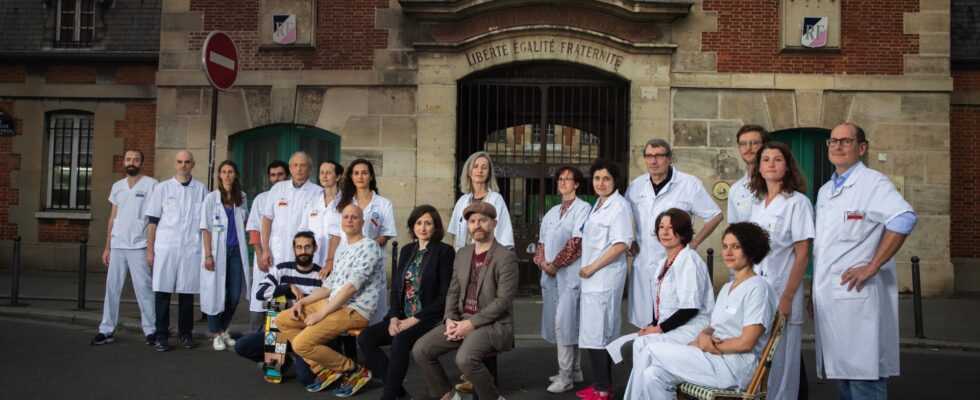From nurses to patients and surgeons, everyone is mobilizing for the public hospital, an institution that operates under the regime.
At the Orleans University Hospital, where more than 90% of paramedics are on sick leave, adult emergencies are idling. “And in paediatrics, notes Dr. Stéphane Perdereau, it’s misery. We have lost three doctor’s posts and yet we are overflowing with activity and city medicine is overwhelmed. We welcome diabetic children in ketoacidosis in dramatic states, these situations blow us up in the face. Our local authorities are completely sluggish. As the hospital is no longer attractive, it no longer knows how to recruit and has not anticipated the aging of a population requiring more and more care. »
Read also: The hospital, forgotten in the presidential debate
In Grenoble, emergencies close intermittently. In Brittany, the situation is also catastrophic. In Rennes, a trade union nurse confides: “We are rinsed, disillusioned, and some are burnt out. At constant numbers, we record more than 200 admissions per day to adult emergencies in Pontchaillou, instead of 150 two years ago. As for the pediatric emergencies at the South Hospital, the staff is struggling to cope with the flow of small patients. Marseille is desperately looking for nurses, childcare workers, radio technicians and, again, emergency personnel. In Le Mans, in Pontarlier, in Metz, the white plan synonymous with the requisition of caregivers had to be activated.
Read also: Overwhelmed hospitals, deprogrammed operations, children in danger
Paris now. In Bichat, the reference service specializing in strokes is 80% closed, “like 50% of stroke beds in Île-de-France, and no one cares”, confides, annoyed, Pierre Amarenco, head of neurology. In Necker, one of the French pediatric institutions, 20% of operating theaters are regularly closed, forcing caregivers “to juggle between the vital and the very urgent”, according to the expression of Pr Sabine Sarnacki, head of the surgery department. visceral and vice-dean of the UFR of medicine, which sees the deprogrammings multiply. At Kremlin-Bicêtre, there is a lack of night nurses in pediatric hepatology. At the Georges-Pompidou European Hospital, presented as one of the flagships of Public Assistance, in outpatient surgery, only two of the six rooms are running; the lack of block nurses forces the use of temporary workers (paid 1.5 to 2 times more), some of whom are over 70 years old. Others, specialized in orthopedics, are called for digestive interventions.
For lack of night nurses, the immunopathology service of Saint-Louis will close. They only earn 1.08 euros more per hour than during the day…
Today, it is the turn of the Saint-Louis hospital to sound the alarm: its clinical immunopathology department, Coquelicot 4, specializing in blood diseases, one of the best in Europe, is threatened. From June 1, he will have to lower the curtain, for lack of 11 night nurses. The reason ? They only receive 1.08 euros net more per hour than during the day, and only from 9 p.m. to 6 a.m., not even the entire duration of the call. Some convert to laser hair removal or baking. And as 9 out of 23 beds have closed for a year, it is as many staggered chemotherapy, patients quickly sent home after a transplant. For lack of beds to take them back, when a complication requires a new hospitalization, they end up in peripheral hospitals, less adapted to their pathology. “Yes, we are putting their lives in danger,” murmurs a doctor from Saint-Louis. The ingenuity of the 60 carers of Poppy 4 is not enough, even if they do not lack imagination. To be heard, they even considered running for president! A few days before the second round, they appeal to the two finalists… despite pressure from their general management, which goes so far as to accuse them of playing into the hands of the RN.
Four former Saint-Louis patients, surrounded by their rescuers, tell us about the importance of this state-of-the-art service.
The actress Jeanne Arènes (Molière 2014), now pregnant, was hospitalized for two months in 2016. With the head of department Régis Peffault de Latour
© Baptiste Giroudon / Paris Match
Mathias, you were diagnosed in 2013 with aplastic anemia, a serious disease of the bone marrow. How was the treatment?
Mathias Malzieu. This service is a 7 star hotel! The bed wasn’t terrible, the room looked like a bad Ibis, but the caregivers, what skill, what humanity! My hematologist, Pr Régis Peffault de Latour, what precision and what emotional intelligence! He could do anything, astronaut, President of the Republic… He’s a philosopher, he carries the service. From the cleaners to the caregivers, no one is working on autopilot, they are all here to save us. They were admirable. I have to love them forever, I have a passion for them.
Jeanne, for the same illness, you spent two months in Saint-Louis in 2016. What do you remember?
Jeanne Arenes. I had never been to the hospital and I discovered an underground life. We cannot imagine so many people so dependent on the public hospital, nor all these caregivers so dedicated. We need their humanity. Otherwise, how and why to fight? I remember Marion, a nurse who didn’t leave my sterile room for two days when I was at my worst. Maxime brought me the umbilical cord blood bags, an incredible moment. Every year, on the anniversary of the transplant, he sends me a message to wish me a happy rebirth. Together, we talked about travels and we laughed at the little quirks of everyday life. It was life in a place of pain.

Nathan Pfeiffer-Smadja, former intern of the service, found himself patient this year. Alongside his doctor, Marion Malphettes.
© Baptiste Giroudon / Paris Match
What memories do you keep of your hospitalization in a sterile room?
Samy Barrett. I was struck by the kindness, the warmth of the people, words too weak to describe the reality. They not only accompanied me in the disease, they saved me. I bonded with everyone but I remember Nicolas, a nurse. He had agreed to play the hairdresser before my chemo. It made me so happy!
Mathias. I think of Vincent, a brilliant nurse who gave me bloodletting. He plays the guitar, he has become a friend. Without forgetting Orlane or Fabienne. And Yasmina, who transplanted me by plugging in the stem cell bags. As with your children, you can’t have a favorite, you love them all! I remember a strong moment in my sterile room, no one can touch me. Nurses ask me what I need. “Kisses!” They put on lipstick and kiss a sheet of paper. I hung it above my bed and, more than eight years later, I still have it with me. This service and these caregivers are like a concert: you are never alone and, when the time comes, to go on stage or enter a patient’s room, you forget everything to give the best to others.
Joan. The first time I went back on stage, a year after the transplant, they came to see me at the theatre. I was moved and, after the performance, we went for a drink. In every intense moment, I think of them. I’m pregnant and I know one thing: my first announcement will be for Coquelicot. They will never leave my life. They offered so much more than care!

The singer of Dionysos, Mathias Malzieu, saved in 2013, and the caregiver Gurwan Guennec.
© Baptiste Giroudon / Paris Match
Nathan, you were an intern in this department in 2018, then a patient at the start of the year…
Nathan Pfeiffer-Smadja. This state-of-the-art and excellent service fulfills its three academic objectives. He is crucial for the management of complex patients, invested in the training of medical students, and his skills and research work advance science. We will not be able to have this level of expertise or this support elsewhere. The private does not know how to do it.
To be heard, doctors considered a presidential candidacy!
How are you coping with the closure?
Mathias. Like a tragedy, a terrible injustice, and that touches me enormously. I want to defend them, because I know their involvement. They work in the cellars of the soul. Do you realize? They do bone marrow transplants! They evolve in suffering, and yet they help us find the light. I am thinking of the patients who will not be able to have access to this care… We must put health before the economy, because eliminating such services is a matter of life and death.

Samy Barrett spent seven months in a sterile room in 2018. Professor Claire Fieschi never let go.
© Baptiste Giroudon / Paris Match
Sami. Closed poppy means I couldn’t survive if I was sick. My “lucky” was to be in 2018 and to have benefited from this service taking care of patients in a desperate state. Its closure shocks me, saddens me and destroys me.
Professor Peffault de Latour, you are head of another service in Saint-Louis, that of bone marrow transplants, and you fear for its future. What should be done ?
Régis Peffault de Latour. A salary increase for nurses is needed: 30% more net, and an improvement in their working conditions, with a sufficient number per patient. We must be competitive with the private sector, capable of attracting them. I have positions funded but vacant due to lack of candidates. Our service is special: if we don’t transplant them, our patients die. And, once transplanted, 3 out of 10 still die of their blood disease. It must also be admitted that the public hospital is not made to make money but to aim for excellence in care and to save lives. This is his mission.
Marion Mamphettes. Contrary to what Martin Hirsch, our general manager, said, it is not enough to say “we are recruiting” to fill vacancies! For two years, 100 positions have been vacant in Saint-Louis. Some nurses live in Aisne because rents are too high in Île-de-France. Many go private or settle in town. It is necessary to fight against absenteeism increased by night conditions. Caregivers prescribe antidepressants. We suffer not only from a loss of meaning but also from exhaustion. The good sisters, it’s over!
